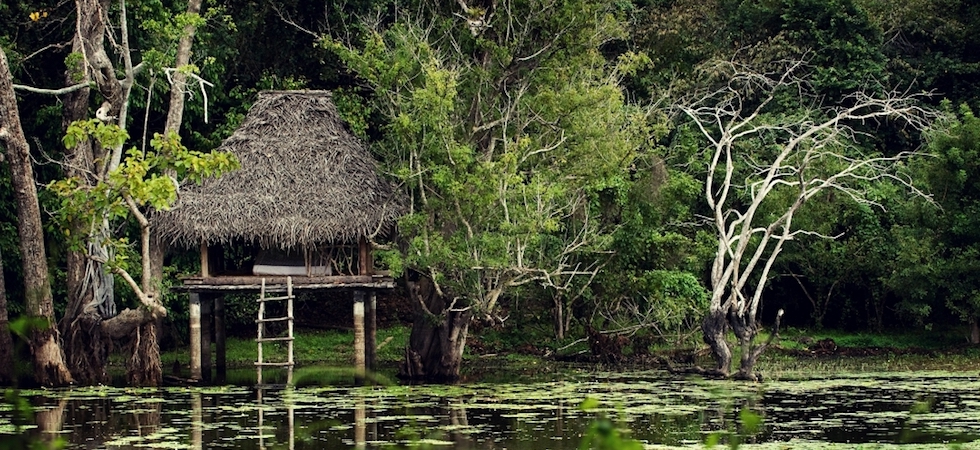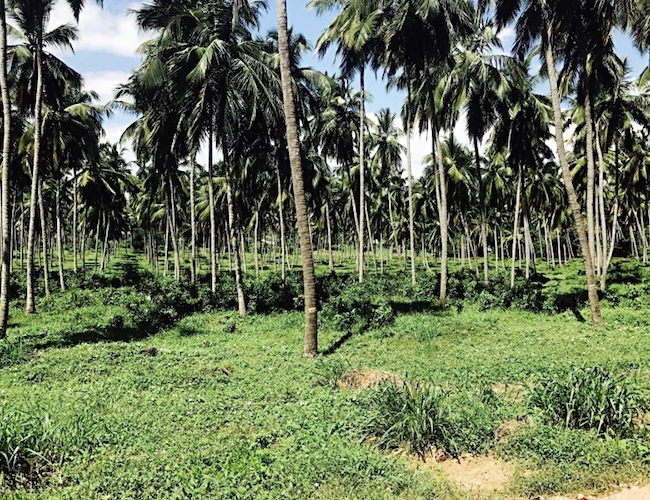When looking for unique places to stay in Sri Lanka, Ulpotha was one of the names that kept popping up. After tons of research and questioning, I reached out to Suzi, sister of co-founder Giles Scott, who ended up going above and beyond in helping me understand more about this property and about Sri Lanka in general.
She told me there wasn’t any electricity on the property (which definitely meant none of my beloved WiFi), oil lanterns were the main form of light, and the food was picked fresh daily and cooked over a fire.
Say no more, I was sold.

Ulpotha is a happy accident that has resulted in a beautiful, mysteriously fabulous place that hotel brands wish they could replicate. And yet, they’ll never be able to get it just right because, unlike Ulpotha, they’ll want to throw in generators, keep food in freezers, and replace the oil lanterns for snazzy “rustic-chic” light switches.
This was the real deal and I was more than ready to embrace it all!
The Review
The Story
I hate to burst any bubbles but Ulpotha’s story doesn’t start with a mystical yogi who wanted to set up a place of solitude. No, it’s a modern day tale about a London property developer who decided to take off on a sabbatical to reset himself and get away from the stress of his demanding job.
This person was Giles and he had planned on buying some land in Bali where he was going to spend his year off. But when one of his dearest Sri Lankan buddies, Viren Perera, told him about a 22-acre plot in Ulpotha he’d purchased from a farmer, Giles decided to hop on board.
In 1996, he said goodbye to Big Smoke and hello to Sri Lanka!
The farmer selling the land made one request. He wanted to make sure that the nature was preserved and the history of the land was respected, from the temples to the paddy fields to the lakes. So they decided to recreate the original model where the property is run and supported by the villagers. It was never intended to be a yoga retreat.
“We wanted it to be self-sufficient—it’s not-for-profit and with the yoga retreat, it just became that and is evolving naturally,” Giles explained to me.
Giles isn’t much of a yoga guy but he gets that people need to relax and unwind (after all, isn’t that what landed him in Sri Lanka in the first place?). That’s why, even though he has a property business portfolio in Colombo, you’ll often find him slipping away from the limelight of the city to seek refuge here, embracing the Ulpotha way of life with the locals and guests.
Spread across 22 acres, Ulpotha’s the kind of place where you can fully immerse yourself in the jungle and forget about your first world worries. Your makeup will remain at the bottom of your bag, your hair will be thrown into a messy bun, and thongs and shorts will be your outfit of choice. It is utterly freeing and idyllic!
Ulpotha is open from November to March and July to August, which aligns with farming season and keeps it fun! Right now, there is a one-week stay minimum but they’ll soon be transitioning to a minimum of two weeks.
Getting There & First Impressions
If your destination provides you with simple but very obvious directions and also advises you not to use Google Maps, as Ulpotha did, you should probably follow those instructions. Our 4-hour drive turned into 6 after I decided to use Google Maps and had poor Kalan driving around in circles and u-turns! (Kalan, you are a superstar for so patiently navigating our way!)
But then we finally turned down a bumpy unpaved lane that made it look like we were driving straight into the wilderness. The OCD part of my brain began to wonder how on earth we were going to reverse our way out of this one but just before true panic started to set in, we saw a man and a simple pole gate ahead of us.
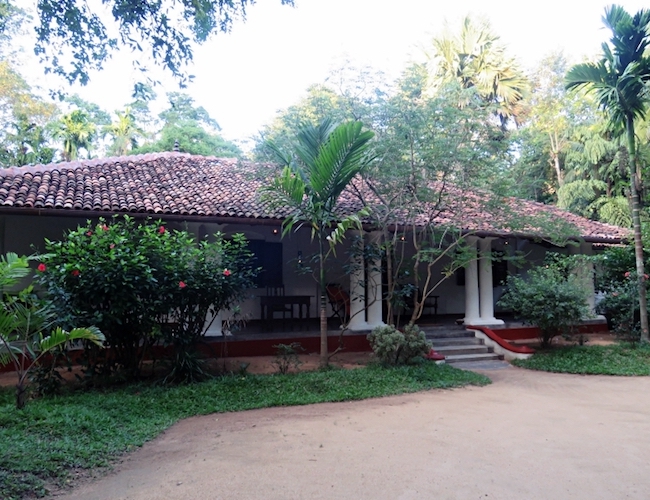
Once you’re on the property, you’ll see the main house, a handsome building that is its own tranquil sanctuary. The stairs up to the porch were flanked with two small bowls filled with carefully arranged flowers floating in water and another one greeted me in the foyer.
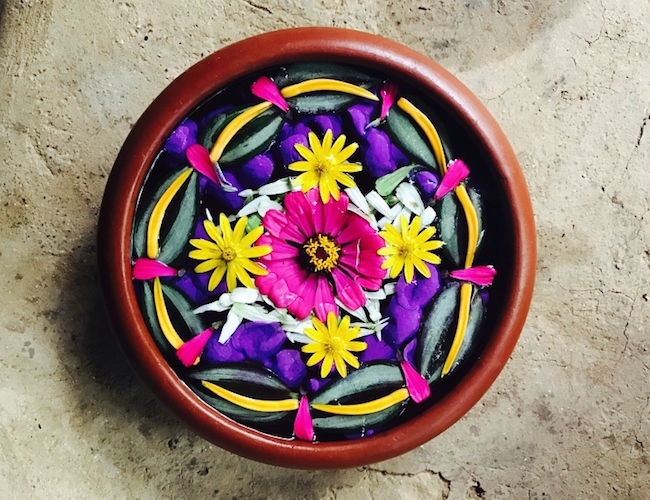
Serene and minimalistic, the main house has an open floor plan with dark wood trim, brightly coloured walls (check out the blue washed ones), and is decorated with simple but beautiful wood furniture, Buddhist statues, artwork, and oil lanterns and candles. In the heart of the house, there’s a lovely courtyard with a tree in the centre of it and wide benches along the perimeter that are perfect for perching. Keep roaming towards the rear of the house and you’ll find yourself outside where a gazebo-like structure stands. This, by the way, is where you’ll enjoy meals with the other guests but more on that later!
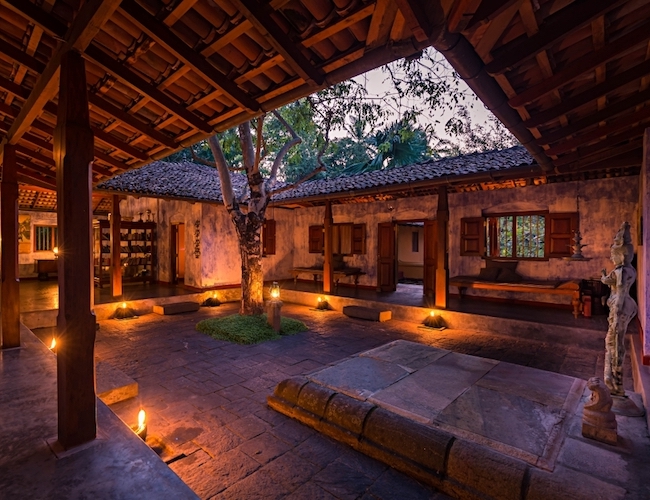
(credit: Ulpotha)
The entire property is absolutely stunning and blissfully quiet. It’s almost like there’s an air of reverence that gently blankets the area—when I went exploring along the dirt paths and around the lake, all I could hear were the sounds of birds chirping and the other random rustles of nature.
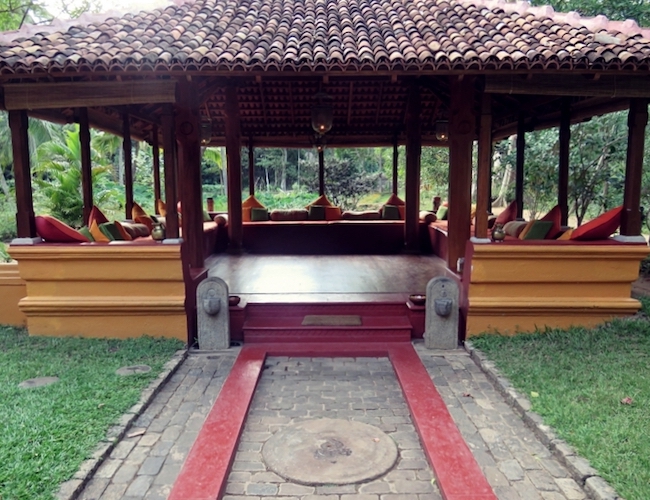
Where You’ll Sleep
The real treat of Ulpotha is that you get to stay in one of the individual open-air huts scattered about the land. There are 11 of them (a mix of single and shared occupancy), constructed from mud, clay, sticks, and twigs (also called wattle and daub).
Is it totally rustic? Yes. Is it amazing? Yes.
At any given time, you’ll probably find about 20 people here. Although Ulpotha encourages sharing to really embrace the communal vibe, they also understand that sometimes people would just rather have their own space, like me. I loved my two days of solitude in hut #5, aka the Fertility Hut…! (Let’s just leave it at that…)
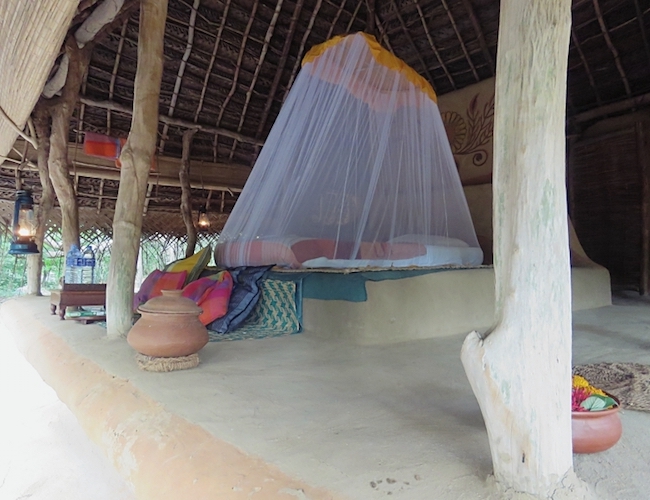
Brushed dirt paths lead up to lovingly decorated huts and strategically placed coconut shells line the path to the main house. There are no doors, windows, or walls in the huts, leaving almost nothing between you and nature. A thatched roof keeps you covered overhead and underneath it you’ll find a wardrobe with a safe, incense, bottles of water, a torch, towels, and a sarong. You’ll sleep in a beautiful bed wrapped in swaths of mosquito netting, with colourful cushions at the foot.
I’ve never slept in anything quite like these huts. Just try to imagine falling asleep to the sounds of the jungle and waking up to sunlight streaming through the trees and taking in a lungful of fresh morning air. There are no glass panes separating you and nature – the outdoors is right there all around you.
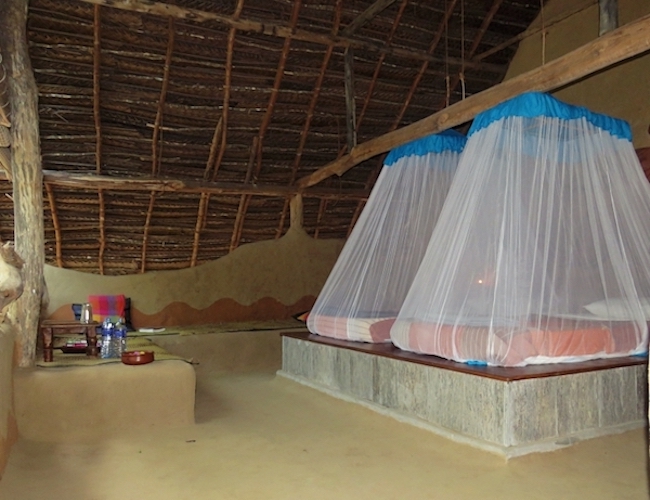
Come nightfall, grab that torch for your walks to and from the main house and make sure you don’t forget it because you will get lost for a while! On my first day, all of the huts looked the same and let’s just say I took the scenic way back to my own hut before the jungle paths became second nature.
For the adventurous (or the romantic), the Lake Hut is one for the books—a magnificent structure on the lake that can only be reached by a rowboat. If you’re not afraid of heights (and don’t have a habit of sleepwalking), try the tree house hut, perched high up within the trees.
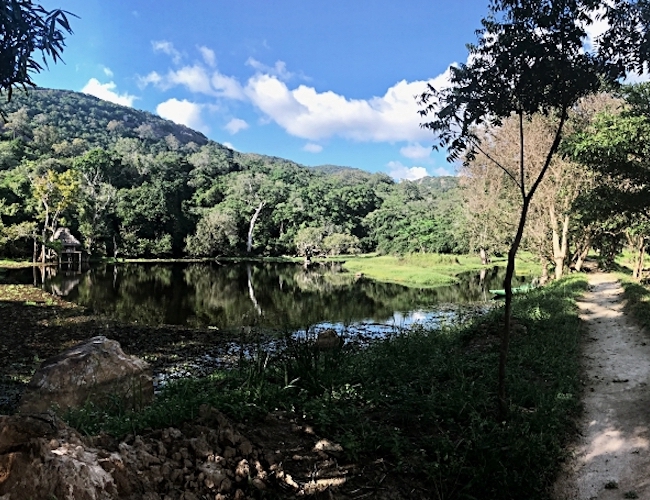
The bathrooms are just a short distance away in separate huts but it’s the shower I want to talk about. Your “stall” is out in the open, behind a stone wall with green vines tumbling down the sides and absolutely nothing above you except the sky. To turn the water on, pull an old wooden lever (which literally looks like it was made out of some wood found on the forest floor) and wait for about 10-20 seconds until fresh, cold water starts streaming out of the stone serpent’s head. What a way to wake up!
Despite feeling like you’re in the middle of nowhere, though, there are designated staff all around Ulpotha who make sure the huts are cleaned and beds remade on a daily basis.
Where to Dine
Start your day with some freshly brewed tea in a hut fiercely guarded with love by the beautiful Karuna, a local lady who is the epitome of world class service. If you fancy something refreshing and a bit more thirst-quenching, she’ll grab her mini machete and deftly chop away at a freshly collected coconut so you can knock back its water. After that, the day is for you to decide!
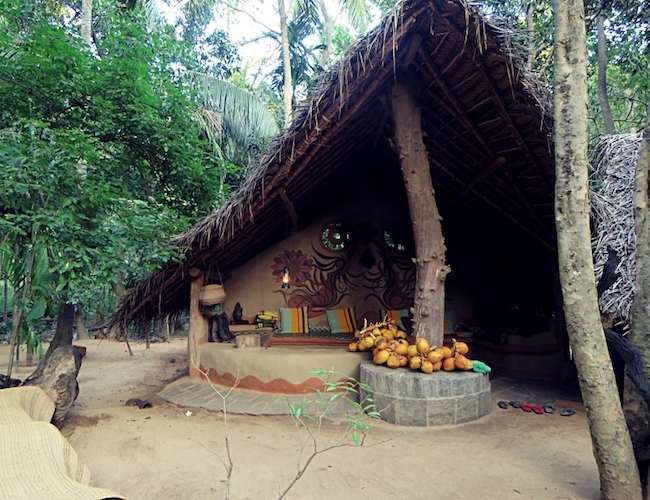
Lunch and supper are served communal-style at the gazebo in the main house and the staff put together a banquet fit for royalty. The exquisitely presented food is served on rattan floor mats and in the evenings, is surrounded by candles and oil lanterns. I had some of the most incredible meals here, made even better by the company. My eclectic group of fellow Ulpotha adventurers was made up of a couple from Barcelona, two budding photographer sisters from London, an American who had just finished working for the UN in Lebanon and was moving back to Boston, and Edith, a Brazilian who worked in the theatre and arts in Paris.
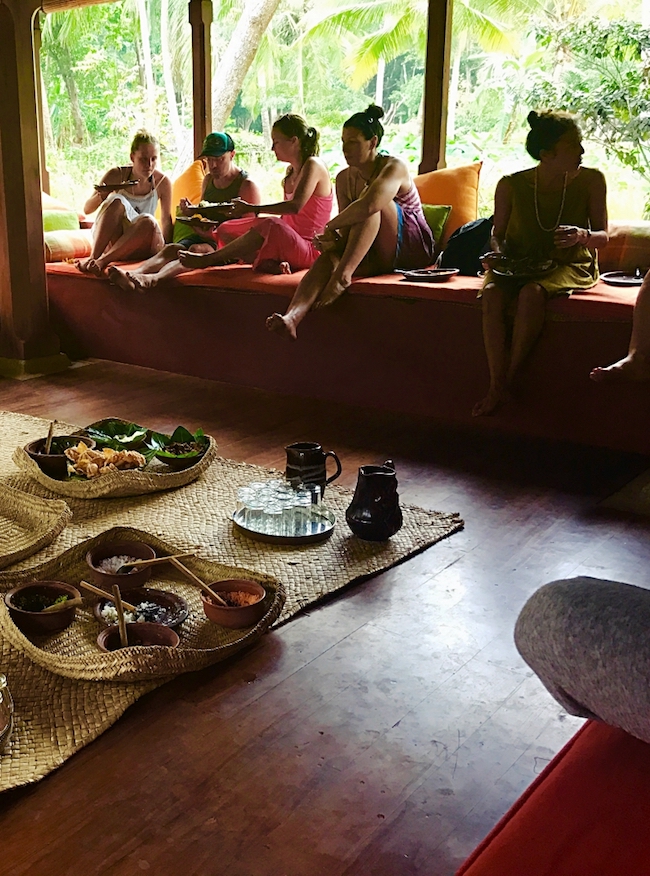
“No one’s told what to do. The chef cooks and prepares on the basis of seeing what has been eaten and left—a menu is then formed,” Giles told me.
The kitchen was mind-blowing, mostly because of how such a simple setup could produce such incredible food. It was one big mud hut that had a spot for preparing the fresh produce and a coal-fired oven where all of the cooking was done. With such fresh ingredients so readily available, you come to realise that you don’t need microwaves, stovetops or other fancy gadgets to prepare awesome meals.
Staff and Service
Ulpotha’s model is fabulous. The property has a community of villagers who call this place home year-round. When guest season arrives, they do everything from preparing meals to making the rooms to assisting the guests and when the season closes, they go back to working on the land.
Giles doesn’t need to worry about staff or job descriptions. The villagers decide amongst themselves what needs to be done and who’s going to do it, and it’s all done purely out of love for the land and simply because they want to.
The people here are beautiful and proud of what they have to offer—you can see that Ulpotha just oozes TLC. The property is carefully maintained on a regular basis; the huts are re-roofed every two years and the walls are covered with mud and repainted twice a year.
Where To Unwind
The great thing about Ulpotha is that, although it accidentally became a yoga-focused retreat, it’s not marketed as that. There was no business plan; it was just an organic evolution spurred on over a few drinks and casual conversation.
Yoga classes take place twice a day at the yoga hut with a polished wooden floor and thick mats. I loved the classes led by Rob Hess, who was one of the guest yoga teachers whilst I was there and just the absolute best. Originally from LA, he started practising yoga in 1989, had his own studio in the US for a while, and then decided to roam the world working at key establishments to share his awesome talent. At Ulpotha, Rob added in his hilarious sense of humour and great taste in music alongside his seriously impressive yoga moves. (Since the teachers rotate, you’ll find different people throughout the year with some who return on an annual basis.)
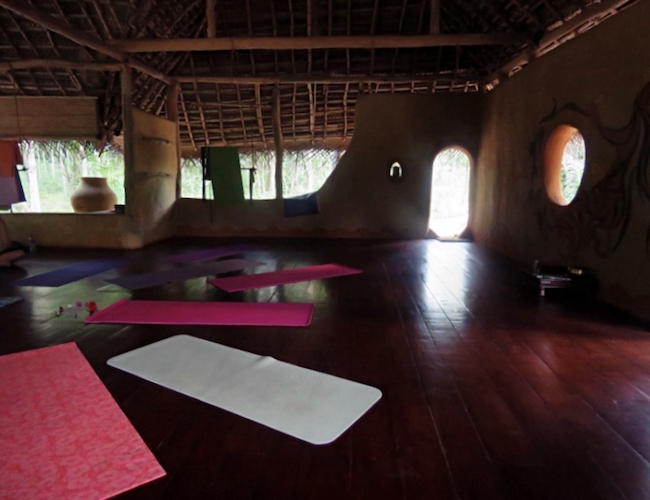
By the way, anyone who thinks that yoga is some flouncy stretching session accompanied by a few “oms” here and there hasn’t experienced this kind of yoga. Between chanting “Om Rām Rīm Rūm Raim Raum Raḥ” and trying to actually do the moves, I ended up feeling like someone had punched me in the abs for the next 4 days. I’m certain these morning sessions torched more calories than my usual running-and-weights routine! In the middle of some poses, I stopped to admire these guys—holding up your entire body weight with just one arm? Balancing on your head without moving? Now that’s true athleticism and grace right there!
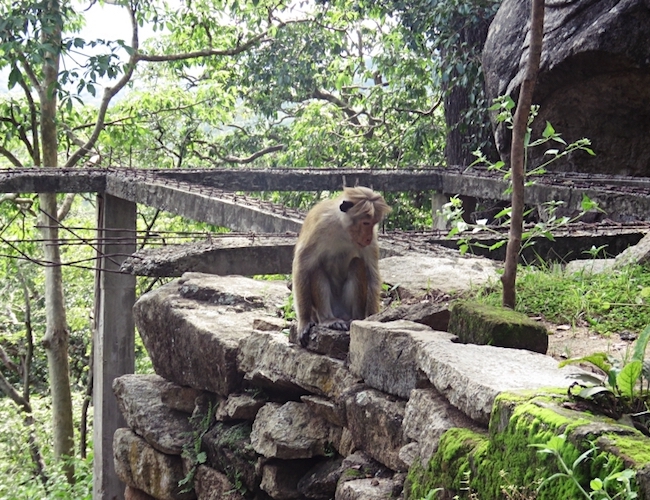
Thankfully, the evening sessions on Monkey Rock were a bit more meditative. Not only was it a fab way to unwind but there were some great photos ops with the fellow monkey yogis looking to join in. This is what makes Ulpotha so great. Yes, many people come here for the yoga and enthusiastically participate but at the same time, you’re not taken too seriously!
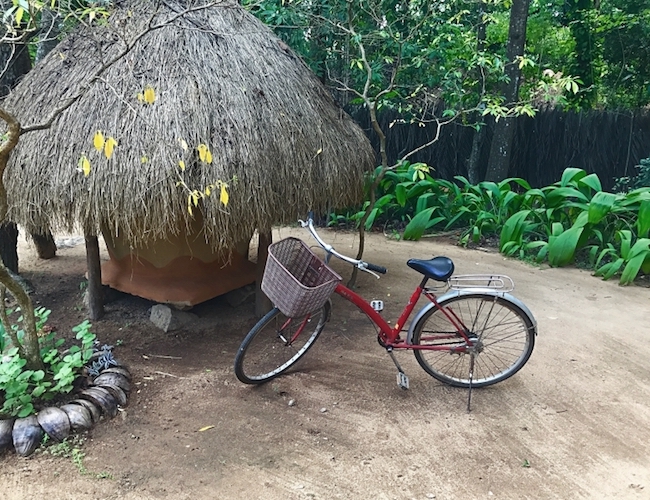
If yoga isn’t your thing, you can just chill and hang out, hop on a bike, or take a stroll up to the monastery (note: women need to be accompanied by a man and be respectfully covered). Walk through what looks like a mystical hole in a rock, dodge those cheeky monkeys, and ponder over why there’s a skeleton hanging in one of the buildings. Then climb on up to a temple called Saliygama Aranya, where you’ll see a stonking Buddha sitting on a rock.
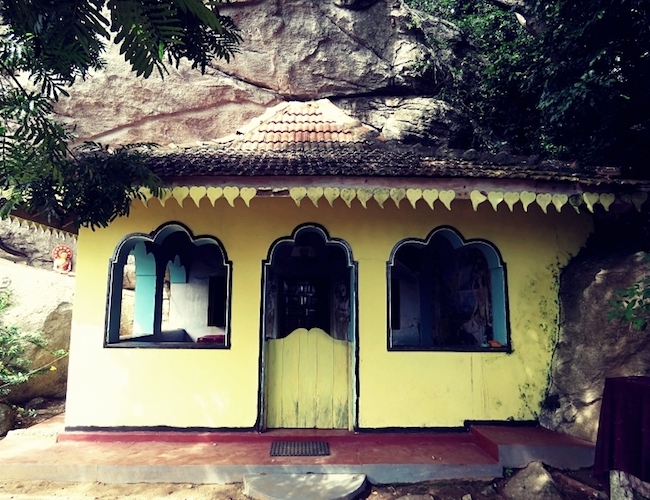
This hour-long hike gave me views almost as awesome as when I climbed Kilimanjaro! If you tend to be snap-happy, remember to bring spare batteries. The main house has solar panel chargers that will juice up cameras and mobile devices (and not much more) but it doesn’t hurt for you to be prepared.
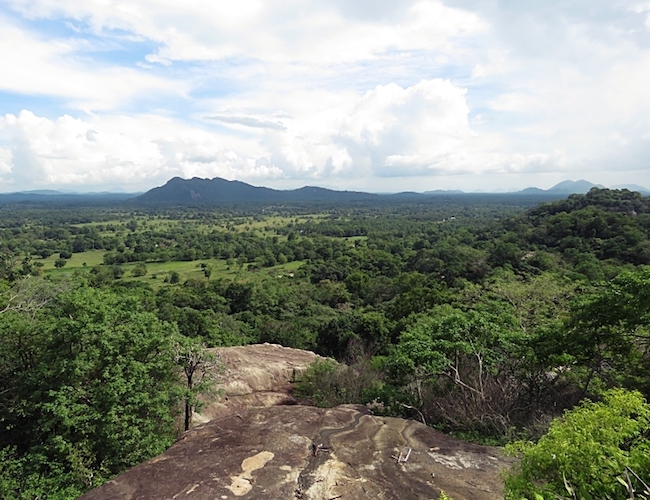
I also had the chance to meet two incredible therapists, Manu and Pauline, who were both jam-packed with appointments. My 90-minute reflexology session with Pauline was phenomenal; she immediately pinpointed my recent shoulder and neck injury and then proceeded to pull, knead, and realign me.
Another big part of Ulpotha is Ayurveda, and there’s a treatment centre open to guests every day during your stay. You can learn about Ayurveda and its benefits and the doctor will remind you that it’s not just about the food or treatments—it starts with relaxation and chilling. There are various programmes of different lengths that allow you to fully embrace the Ayurvedic process.
As a feel-good bonus, the treatments enjoyed by the guests go towards funding a small Ayurvedic clinic nearby which was built by Ulpotha and is run by their doctor. This awesome system allows the clinic, which is open Mondays and Thursdays, to offer free treatments and Ayurveda medication to the local community.
What’s fab about the treatment centre is its simplicity. Forget the big, shiny saunas and fancy stuff! Here, there’s what looks like a sun bed made out of cane that’s heated from underneath. Nothing more, nothing less, and it’s brilliant.
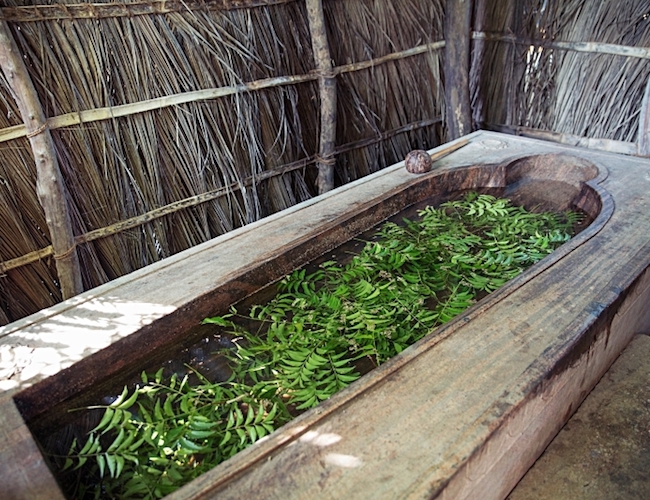
(credit: Ulpotha)
PRA SAYS
Ulpotha is a life retreat and you’ll end up having some sort of epiphany here—it’s just that kind of environment. It might be a moment of clarity that dawns on you whilst surrounded by fireflies and stars twinkling overhead or recouping and reevaluating things as you perfect that downward dog. It may not make the world shake but it will bring you back down to earth to realise that indulgence starts with the nature and wonder immediately around us.












